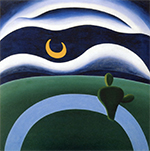
The Dark Places of Psychology
"let us trace the pattern, however disconnected and incoherent
in appearance, which each sight or incident scores
upon the consciousness" (3).
Points for Reflection
Virginia Woolf's "Modern Fiction" (1925), PDF
- with what tone does Woolf downplay the accomplishments of H. G. Wells and Arnold Bennett?
- do those of you famliar with Wells's work, including The Time Machine (1895) and The War of the Worlds (1898) concur with Woolf's conclusion that he ignores "spirit" in order to focus on "the body" (1)? (Admittedly, she thinks Bennett and Galsworthy the worse culprits, but she still encompasses Wells in her critique.)
- what might Woolf consider to be "unimportant," "trivial" and "transitory" things undeserving of the primacy of place given them by the three male authors she names?
- does Woolf closely delineate what she wishes to find in a novel?
- can you reconcile the apparent contradiction between Woolf's assertion that what matters in life is our "unknown and uncircumscribed spirit," and her determination that novelists should "convey" this quantity (3)? How, that is, does one describe the indescribable?
- does Woolf affirm literary convention and custom, or take aim at them?
- in the same breath that she praises Irish modernist James Joyce for revealing "the flickerings of that innermost flame which flashes its messages through the brain" (3), accuses his work of being "centred in a self which, in spite of its tremor of susceptibility, never embraces or creates what is outside itself and beyond" (4). Can you recall any Romantic poets who directed similiar critiques at one another in the early nineteenth century?
- why does Woolf so highly value Chekhov and other Russian writers, and what limitations does she dare to locate in work which she obviously so highly esteems?
- do you agee that "everything is the proper stuff of fiction" (5), that no topic should --by common, courteous consensus--be avoided by conscientious writes?
- should we be bothered by the particular way in which Woolf genders Art as female in the essay's closing line?

The Moon (1928)
Tarsilia do Amaral (Brazil)
Dr. Paul Marchbanks
pmarchba@calpoly.edu
![]()
